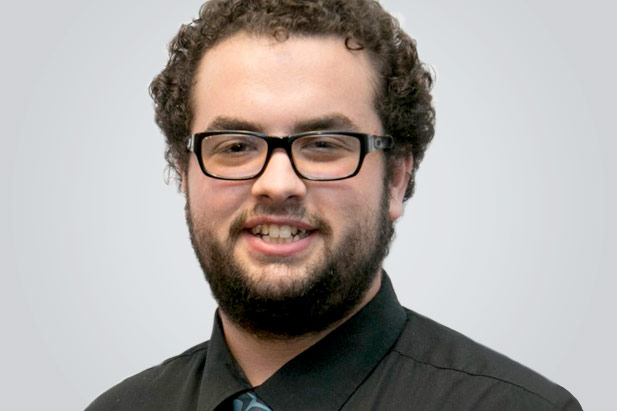Aboriginal role model showing peers how to take their futures further at UOIT
February 4, 2016

When it comes to making the most of his university student experiences, Christopher Grol certainly sets an impressive standard.
Chris is a 2015 graduate of the Forensic Psychology program at the University of Ontario Institute of Technology (UOIT). In the final two years of his studies, the proud young Métis from Oshawa, Ontario was a work-study student at the UOIT-Baagwating Indigenous Student Centre (UBISC) and an integral part of planning and implementing UBISC’s annual Indigenous Awareness Week activities.
“I knew I wanted to help people from a very young age, but felt powerless until I took a high school Psychology class where we learned about the human brain,” explains Chris. “That course led me to enrol in Forensic Psychology at UOIT, a program that explores the intersections between law and psychology. The program provided a deep understanding of the holistic nature of mental health, its impact on vulnerable populations, and how to help people overcome associated service and legal barriers to get assistance.”
Recently Chris was named Student Development Specialist, Indigenous Programming at UBISC, becoming an important role model at the same time as the launch of a new provincewide initiative to inspire Aboriginal youth to see the benefit of higher education.
Chris’ academic journey is one of many featured in the ‘Let’s Take Our Future Further’ campaign launched February 2 by the Council of Ontario Universities (COU), on behalf of UOIT and the province’s other publicly funded universities. Future Further aims to celebrate the achievements of Aboriginal learners currently studying at Ontario universities, along with Aboriginal university graduates, who make a daily difference in their communities.
“We are delighted to have Chris with UBISC to play such an important role in helping guide our current students as well as welcoming future students to the University of Ontario Institute of Technology,” says Jill Thompson, Indigenous Cultural Advisor, UOIT Student Experience Centre. “As a UOIT graduate who has contributed so much to UBISC in recent years, Chris also brings tremendous local awareness to our team, having also worked with the Oshawa Community Health Centre.”
As part of the Let’s Take Our Future Further campaign, COU has launched the website futurefurther.ca, featuring compelling profiles and videos from 13 role models who are studying at, or have recently graduated from, an Ontario university. Chris is one of the role models highlighted in the series.
He has been heavily involved in UBISC’s cultural events and was Fire Keeper for the past year at UBISC’s Sweat Lodge ceremonies. He also received the UOIT President's Award of Excellence in Student Leadership in September 2015.
“I remember what it felt like as a first-year student, so I am very excited about the potential impact of the Let’s Take Our Future Further campaign,” says Chris. “This project complements our efforts at UBISC to promote awareness about student opportunities and share success stories. There are so many supports and services in place here at UOIT to help Indigenous learners take that important first step toward a university education.”
Chris may also eventually pursue graduate studies.
“I hope to eventually pursue a Master of Applied Clinical Psychology, and moving from there into a PhD, eventually becoming a Clinical Psychologist specializing in services for Aboriginal Youth with varying mood disorders.”
Future Further campaign profiles other graduates from across Canada
Among other role models across Canada featured in the Future Further campaign, Raigelee Alorut, tells how she overcame the challenges of attending university as a mature student and grandmother and how she hopes that her Honours Bachelor of Arts will serve as an inspiration to her grandchildren. Another – Donna May Kimmaliardjuk – describes the welcoming home she found at her university’s Aboriginal Student Centre and the personal growth she experienced while studying to become the first female Inuit cardiac surgeon.
To view all 13 videos and profiles and to find out more about Aboriginal learning, visit futurefurther.ca.
Resource kits for Aboriginal learners transitioning into or considering attending an Ontario university will be distributed widely during the COU’s campaign.
During the week of February 8, an online video contest will launch on Twitter and Facebook asking Aboriginal learners currently enrolled in university to tell their story about how university education has taken their future further, and how it has enriched the future of their communities.
The COU campaign comes just months after a report by the Truth and Reconciliation Commission, which put a spotlight on the need to ensure equitable access to postsecondary education for Aboriginal students.
November also marks the anniversary of the Report of the Royal Commission on Aboriginal Peoples, which highlighted the many benefits of education and the huge costs to individuals and communities if these opportunities are missed.
According to Statistics Canada, seven per cent of Canada’s self-identified Aboriginal population has a university degree or certificate compared with 21 per cent of Canada’s non-Aboriginal population.
In Ontario, nine per cent of Ontario’s self-identified Aboriginal population in that age group had a university degree or certificate compared to 23 per cent of Ontario’s non-Aboriginal population.
The same Statistics Canada survey indicates that Aboriginal youth between 15 and 24 represent 18 per cent of the total Aboriginal population in Canada; a further 28 per cent are children aged 14 and under. This means a significant number of Aboriginal youth will be contributing to Canada’s economic and social prosperity by 2026.
Future Further links:
-30-
For further information, please contact:
Communications and Marketing
University of Ontario Institute of Technology
905.721.8668 ext. 6709
289.928.3653 (cell)
communications@ontariotechu.ca



